In the largest study of its kind globally, UK clinicians and researchers at Royal Manchester Children’s Hospital (RMCH) part of Manchester University NHS Foundation Trust (MFT), and Great Ormond Street Hospital (GOSH) have jointly developed a highly innovative, life-changing surgery for children with a rare genetic condition.
Eleven patients from the UK and internationally with Mucopolysaccharidosis IVA (MPS IVA), also known as Morquio A syndrome aged 11 to 19 years with severe airway obstruction, received the novel surgery developed by specialists at RMCH and GOSH.
Around three children in England each year are born with Morquio A syndrome. The condition is caused by the lack of a key enzyme which breaks down large sugar molecules. Without this enzyme, the sugars build up in the body’s cells, resulting in a range of bone and multi-organ effects. Approximately a third of children with Morquio A develop serious life-limiting airway kinks and blockages in the trachea (the passageway for air to move in and out of the lungs) and will die before adulthood. There are currently 90 patients afflicted with Morquio within the UK.
Before the RMCH and GOSH collaboration, tracheal resection surgery for Morquio A was considered highly experimental and high-risk, involving operating on the aorta, the main artery that carries blood away from the heart to the rest of the body and cardiopulmonary bypass (CPB) – a machine that takes over the work of the heart and lungs.
The innovative surgery, the brainchild of Professor Iain A Bruce, and Mr Richard Hewitt, Consultant Paediatric Otolaryngologists (Ear, Nose and Throat specialist) at RMCH and GOSH respectively, involved removing a part of the windpipe and the upper part of the breastbone through an incision in the neck which eases the blockage in the trachea, without the need for CPB.
Gracie’s story
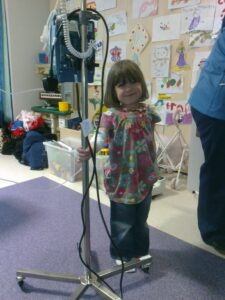 Gracie Mellalieu 17, from North Wales who is currently at college studying Creative Media Production, lives with her mum Yvette, 44 and dad Jonathan, 45, had the ground-breaking tracheal surgery in 2021.
Gracie Mellalieu 17, from North Wales who is currently at college studying Creative Media Production, lives with her mum Yvette, 44 and dad Jonathan, 45, had the ground-breaking tracheal surgery in 2021.
Since her Morquio A diagnosis when she was three years old, Gracie has travelled to RMCH every six months for appointments with her consultants. This includes Professor Bruce, who has treated her for 14 years due to hearing issues and recurrent ear infections which are symptoms of her condition.
Gracie said: “I hadn’t told my family or friends just how much I was struggling before the surgery, but I at that time I felt I just couldn’t breathe. I thought that I was coming to the end of my life. So, when Professor Bruce discussed the surgery with us, I didn’t hesitate to say yes.
“We didn’t know for a few days if the operation had been successful, because it was only after my breathing tube in my throat was removed, that for the first time in years, I was able to take a deep breath. At that point I began to cry my eyes out, I was so happy.”
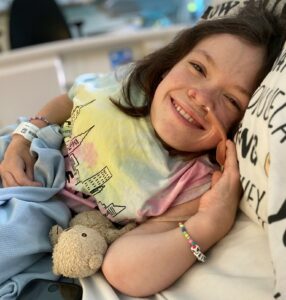 Yvette said: “When Gracie took that breath, it was the most incredible feeling. We just felt overwhelmed that she had been given her life back.
Yvette said: “When Gracie took that breath, it was the most incredible feeling. We just felt overwhelmed that she had been given her life back.
“Gracie was able to return home just six days after the surgery. She’s since completed her first year at college and is very ambitious and focused on what she wants to do. She would love to get an apprenticeship with the BBC once she’s finished college.
“Morquio A is a life limiting illness and a lot of the time it is the airway issues that end life. We just feel so grateful to the whole team, for developing this method of surgery. I feel like it changes the lifespan of Morquio.”
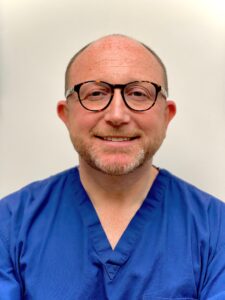 Professor Iain A Bruce said: “This collaborative research is a real game-changer. For the first time we have a safe and effective way to address life-limiting narrowing of the windpipe in this remarkable group of individuals.
Professor Iain A Bruce said: “This collaborative research is a real game-changer. For the first time we have a safe and effective way to address life-limiting narrowing of the windpipe in this remarkable group of individuals.
“This study represents a significant step forward in offering a promising, new solution for our patients with this devastating condition and we are hopeful it will provide a life changing and safer alternative, improving their quality of life.
“The next challenge is to better understand when surgery to shorten the kinking of the windpipe should be considered. This collaboration within the NHS provides the blueprint for further work to improve the quality of life for people with rare diseases. Most importantly, thanks go to the young people and their families for their bravery, insight and understanding in taking part in this research.”
The successful surgical technique uses Advanced Airway Analytics, incorporating 3D tracheal modelling and virtual endoscopy technology, enabling better visualisation and assessment of airway disease.
Mr Richard Hewitt, Paediatric Otolaryngologist Ear Nose and Throat (ENT), Head and Neck and Tracheal Consultant, GOSH, where the surgeries took place, said: “It has been a privilege to be part of this excellent example of multidisciplinary collaboration that has enabled a significant advancement in the understanding and management of the life threatening critical airway disease in Morquio patients.
“On a personal level, I have been asking and seeking for a better understanding of the evolution and nature of the problem to be in a position to create a bespoke surgery that was both safe and ethical and also addressed as many of the relevant problems as was possible. This has only been possible due to open and inclusive inputs of many scientists, doctors, allied health care professionals and, most importantly, the MPS support network, patients, carers and parents. To have witnessed the results has been amazing and humbling. The young adults and their families have been an inspiration and continue to be the key part of the evolution of this new approach to airway management.”
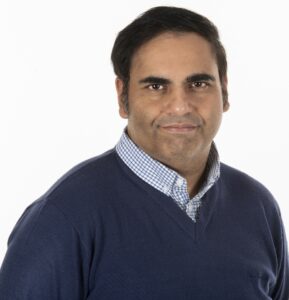 Dr Johnny Kenth, Consultant Clinical Academic in Paediatric Anaesthesia at RMCH, part of MFT whose PhD research focuses on Morquio syndrome, explored the use of 3D modelling to aid in the development of the novel surgery, and said: “The results of this study are extremely promising. All patients who received the novel surgery showed significant improvement in breathing and lung function. Additionally, patients reported better quality of life, including increased physical capabilities and there were no major long-term complications from the surgery.
Dr Johnny Kenth, Consultant Clinical Academic in Paediatric Anaesthesia at RMCH, part of MFT whose PhD research focuses on Morquio syndrome, explored the use of 3D modelling to aid in the development of the novel surgery, and said: “The results of this study are extremely promising. All patients who received the novel surgery showed significant improvement in breathing and lung function. Additionally, patients reported better quality of life, including increased physical capabilities and there were no major long-term complications from the surgery.
“Our novel approach now offers a far less invasive, and safer alternative, with better outcomes. Further research and long-term follow-up with our participants on the study are now needed to confirm the lasting benefits and safety of this approach.”
Researchers at RMCH and the Willink Unit within the Manchester Centre for Genomic Medicine at Saint Mary’s Hospital, the largest lysosomal storage disorder centre in Europe, also part of MFT, worked in collaboration with GOSH, home to the national tracheal unit to develop the innovative solution. Prior to the development of this surgical intervention, patients with end-stage airway obstruction who did not respond to enzyme replacement therapy had no recourse other than palliative supportive care.
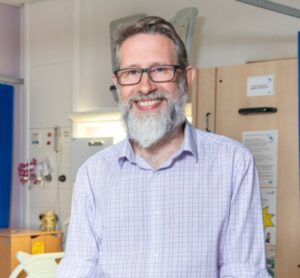 Professor Simon Jones, Consultant in Paediatric Inherited Metabolic Disease at the Manchester Centre for Genomic Medicine at Saint Mary’s Hospital and paper co-author said: “We are delighted that the findings of this research offer a promising new solution for enhancing the quality of life in children and adolescents who previously had continued to deteriorate despite enzyme replacement therapy.
Professor Simon Jones, Consultant in Paediatric Inherited Metabolic Disease at the Manchester Centre for Genomic Medicine at Saint Mary’s Hospital and paper co-author said: “We are delighted that the findings of this research offer a promising new solution for enhancing the quality of life in children and adolescents who previously had continued to deteriorate despite enzyme replacement therapy.
“This combined effort between MFT and GOSH, highlights the importance of multidisciplinary teamwork and how advanced technologies are providing new and safer treatment options for our patients.”
Global first – Isaac’s story
In 2020, Isaac Eaton, aged 17, a patient at RMCH, was the first person in the world to receive the tracheal surgery. He will soon be starting the third year of his degree course in Drama and Performance Practice at the University of Gloucestershire and recently participated in the Edinburgh Festival Fringe.
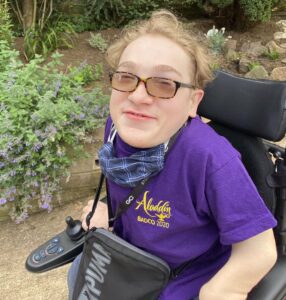 Isaac said: “Having the surgery has made a huge difference to my life and it’s given me the opportunity to do things that I had previously considered impossible. Since the surgery, I have regained the ability to walk with the support of a walking frame for balance and my health is much more stable, giving me the energy and stamina to take part in my university course, and other activities which previously would not have been possible for me to do.”
Isaac said: “Having the surgery has made a huge difference to my life and it’s given me the opportunity to do things that I had previously considered impossible. Since the surgery, I have regained the ability to walk with the support of a walking frame for balance and my health is much more stable, giving me the energy and stamina to take part in my university course, and other activities which previously would not have been possible for me to do.”
Isaac’s mum, Anna said: “Although we were nervous about this new surgery during the preceding months, Isaac felt that as his breathing problems were severely affecting his quality of life, and the chance of improvement meant it was worth taking the risk.
“Prior to the surgery Isaac was using most of his energy simply to breathe and had to constantly manage his posture to maintain an open airway, which gave him back pain. After being home from hospital for about a week after the surgery, Isaac was already starting to feel that he had more energy and soon after started intensive physiotherapy to improve his fitness and mobility.
“From a family point of view, family activities are no longer limited by Isaac’s energy levels and his care needs have reduced. The focus is now on supporting his independence and plans for the future rather than the day to day care he needed at his weakest point prior to surgery.
“Taking part in medical research is a very personal and individual decision but we would definitely encourage others to consider it positively.”
Fiona Stewart, Chair of the Clinical Scientific Advisory Committee (CSAC), MPS Society said: “I am delighted to see how this study, which we supported, has improved our knowledge of how tracheal surgery can improve the clinical outcome in some of our patients. I feel it is important that this information is disseminated as widely as possible so that in the future more individuals may have the opportunity to benefit from this type of surgical procedure. Very well done to the team in Manchester, working collaboratively with GOSH on this research.”
The results of the study: “Novel approach for tracheal resection in Morquio A syndrome with end-stage critical airway obstruction: a UK case series” have recently been published as a paper in Orphanet Journal of Rare Diseases.